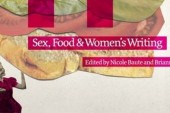
Image: MunroBooks
Text/Book, the Toronto Standard‘s books column, is written by Emily M. Keeler and Chris Randle, plus occasional guests.
Soon the linden trees will blossom and we of the city will wander around smelling spunk in the air. You could almost sense it last Monday night, at the AGO. Almost.
For part of her stint as an artist-in-residence there, Margaux Williamson organized I’m a Very Sexy Baby, a panel of women who have written explicitly about sex. Tamara Faith Berger, Sheila Heti and Chris Kraus all read racy selections from their works, and the audience sat in the erotically charged Jackman Hall, lapping it up.
After some steamy readings on blowjobs, dick-loving women acting like excited little lapdogs, and one sixteen-year-old girl orgasming while a semi-sadistic older man thrusts a flute into her overeager mouth, there was a discussion period led by Darren O’Donnell.
Having been called in at the last minute to moderate the panel, O’Donnell described his weekend of speed-reading and preparation as one spent in a “fugue of cock and cum.” A murmur of understanding laughter passed through the audience; from what we had just heard, we knew exactly what he meant.
Both Chris Kraus’s I Love Dick and Tamara Faith Berger’s Maidenhead involve narrators who are versed in critical theory, who turn to philosophy to make sense of their own desire’s complexity. And while Sheila Heti’s How Should a Person Be? makes only casual mention of specific thinkers, the book reads like a work of phenomenological philosophy in its own right. These writers are collectively engaged in making critically informed art, even when–or especially when–they write about sex.
O’Donnell asked the panelists if they felt that theory could be phallic in some respects, or wielded as a weapon. Kraus shook her head. “[In I Love Dick] I was being a little faux-naïve, and a little arrogant too.” She went on to describe her engagement with theory as an experiment with a secular sort of immanence, and remarked that it only feels like a wielded thing, a weapon, when someone is using theory for style rather than substance; it’s only alienating if the speaker herself doesn’t understand it.
And it’s true, isn’t it? It’s one thing to signify your familiarity with a canon of so-called higher thought by dropping names, but it’s another to develop for yourself the significance of the ideas represented by those French-inflected turns of phrase.
Developing that sense of significance is integral to the structure of Berger’s Maidenhead. At the beginning of the novel the main character, Myra, is just a white suburban teen on a beach in Florida in spring. Because she is in the middle of a weedy adolescence she feels both love and disgust for her family, love and disgust for the world at large. She is practically a blank slate, both a privileged daughter of the world and a lost explorer within it, discovering gradually what it means to live. For Myra so much of life has yet to happen, and she looks with an aspirational longing at the many college-aged women populating the resort where her family is staying.
So it’s in Florida, surrounded by bare flesh and nearly consumed by the constant promise–or is it threat?–of sex, that Myra begins to untangle the threads of her own developing desire. Berger situates her teen heroine on the edge of a vertiginous cliff, and with some salacious stinging prose (though very little fanfare) pushes her right off.
Myra meets a man, Elijah, and she follows him nervously but hungrily to his room, where he makes her kneel down in front of him so that he’s standing there like a king, towering above her, and pisses all over her, hot urine hitting her hair and dripping down her face and over her shoulders. Then, as she runs out the door and into the street he gives her a new name, calls her newly into being: “Come back, little bitch.”
When she gets home she can’t go back to a time before; she cannot un-become herself. So she moves forward instead, exploring pornography and drugs, building for herself the liminal world where all adolescents live. Berger introduces the chorus of womanly intelligence that has so far tagged the end of each scene: the college-aged Lee, armed with feminist theory, and the ribald pornographer Gayl, a liberationist who makes Bruce LaBruce look tame in comparison. With these women in her life and in her head, Myra embodies appetite anew; her mind becomes a mouth that gorges on Hegel and Bataille, and her body a cavernous stomach that craves Elijah and his sexed violence.
Berger probes the master/slave dialectic, and layers her narrative with subtle reflections on the complexities of sex, class, and race. But the philosophical underpinnings of Maidenhead never overwhelm a sense of Myra’s tumultuous, occasionally dangerous desire; in fact, they demonstrate an electric simultaneity of urges. When Lee corrects Myra’s reading on Bataille’s articulation of knowledge, Myra laughs at her own desire to bridge the noumenal and corporeal realms: “The cracks? Knowledge is cracky? Was it hairy too? I started laughing. It hurt my jaw to laugh. Was cracky, hairy, uncertain knowledge the key to getting fucked a thousand times?” Who wouldn’t want both?
During the audience Q&A period of the panel, a woman in the audience raised her hand. When Williamson handed her the mic, her face took on a flushed quality and she beamed in the direction of the stage. She wanted to talk about ideas. Perhaps a little nervous, she addressed the writers: “Theory is really hot. It’s all part of that sexuality. Do you feel excited when you come across it in your work?” She gulped a little.
There was a beat of silence, and O’Donnell and Williamson both tried to rephrase the question for clarity. “Is theory hot?” Williamson implored. There was a nervous laugh, as if the idea were too ridiculous to bear. O’Donnell got a little bit more concrete, asking the writers: “Does theory make you wet?”
“Um, no,” Kraus said. But our minds are in our bodies, and everything is linked. She smiled, adding that she does tend to hyperventilate when she grasps good art, or a great idea. Heti and Kraus smiled as Kraus spoke. The issue, she guessed, is that “if you’re sincere, you’re abject.” Given the scenes of powerful submission and degradation we had all heard read aloud that night, it felt like that was kind of the point, to explore abjection, to get intimate with the sincerity of a self caught at the moment of transcendence, or annihilation.
_____
Emily Keeler lives in Toronto, Tumblrs for The Millions, and edits book stuff at The New Inquiry. Follow her on Twitter at @emilymkeeler if you please.
For more, follow us on Twitter at @torontostandard, and subscribe to our newsletter.














